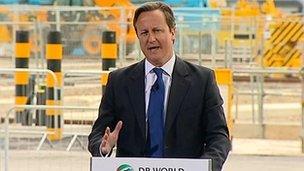David Cameron: UK must be at EU top table
- Published

David Cameron: We're equipping Britain to succeed in the modern world
Prime Minister David Cameron has said the UK should be at the "top table" of international institutions, including the European Union.
The PM is seeking to renegotiate the UK's relations with the EU before an in/out referendum on membership.
But in a speech in London he denied being a "little Englander", saying the UK should take part in the "global race" - but stand up for its interests.
His aim was for Britain to be the best place in Europe to do business.
In a wide-ranging speech Mr Cameron said the government's domestic priorities were "a stronger economy, welfare that works, a world-class education system - and we are pursuing them with ruthless ambition".
He said: "We are taking the right decisions, in this generation, for our country to succeed. This is the generation that hasn't passed the buck. Where there has been a fork in the road between doing what is easy and doing what is right, we have chosen what is right.
"We have started changing our country just in time, equipping Britain to succeed in the modern world."
'National vanity'
In his speech at the DP World construction site at London Gateway, Mr Cameron said the global economic race meant "that to succeed, it's no use hiding away from the world - we've got to roll our sleeves up and compete in it".
He added: "And it's no use giving in to the world - we've got to be unashamedly bold and hard-headed about pursuing our national interests."
Mr Cameron, a number of whose MPs are in favour of the UK leaving the EU, stressed the importance of having influence via its EU membership.
He said a key part of his international ambitions for the UK "is our place at the top table. At the UN. The Commonwealth. NATO. The WTO. The G8. The G20 and yes - the EU".
Mr Cameron added: "Membership of these organisations is not national vanity - it is in our national interest.
"The fact is that it is international institutions, and in them, that many of the rules of the game are set on trade, tax and regulation.
"When a country like ours is affected profoundly by those rules, I want us to have a say on them."
"That does not mean supinely going with the flow of multilateral opinion, the lowest common denominator approach to democracy, as we've seen in the past. At the European Union we are prepared to stand up for Britain's interests with resolve and tenacity."
He said the UK was "seeking to shape a new settlement in Europe, to get a better deal for Britain in it and to equip Europe as a whole to compete in the world".
"This is about boldly pursuing our interests - not by withdrawing from the world but engaging with it."
He also referred to the agenda for the G8 summit next week, highlighting backing for moves to cut bureaucracy in Africa and an international agreement on tax evasion and more transparency in mining, oil and gas.
"This is how our country thrives - when we lead, when we strive to be more than the sum of our parts, the small island with the big foot-print in the world and that's the way it must stay," Mr Cameron said.
'Cannot be insular'
There was a mixed reaction to Mr Cameron's message on Europe - Conservative MP Bernard Jenkin, a Eurosceptic, said: "The prime minister has come to Essex to warn that we cannot afford to be 'little Englanders' - and he is right - but we cannot afford to be 'little Europeans' either, but that's where the EU is taking the UK.
"He is right that the UK's prosperity and security depend so much on what happens in the rest of the world, but wrong to suggest that the UK must stay in the EU. Unless there is a fundamental change in our relationship with the EU, the UK will simply have to leave the EU, so British business is free to compete."
Matthew Elliott, chief executive of Business for Britain, which campaigns for a renegotiated deal with the EU, said: "The prime minister is entirely correct that Britain cannot be insular, but this doesn't mean that businesses in Britain are ready to accept the EU as it is formed currently."
Terry Scuoler, chief executive of manufacturers' body the EEF, said: "We will only generate a stronger, more balanced economy by creating an environment for business that compares with the best in world and by taking full advantage of the trading opportunities right across the globe.
"The best way to achieve these aims is by playing a full and active role in the EU to make it more competitive and to ensure that British business has the best possible access to fast-growing markets across the globe."
TUC general secretary Frances O'Grady said: "David Cameron should have used today's speech to outline how Britain could work with the EU to improve jobs, growth and living standards.
"However, the Prime Minister opted instead to take a cheap shot at teachers and welfare claimants by spuriously claiming they were holding Britain back in the global race."
- Published13 May 2013
- Published12 May 2013
- Published16 May 2013